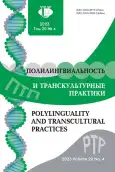Languages of the Indigenous Peoples of Siberia: Ethnic Translation Aspect
- Autores: Razumovskaya V.A.1
-
Afiliações:
- Siberian Federal University
- Edição: Volume 20, Nº 4 (2023)
- Páginas: 673-683
- Seção: THEORY AND PRACTICE OF TRANSLATION
- URL: https://journal-vniispk.ru/2618-897X/article/view/326671
- DOI: https://doi.org/10.22363/2618-897X-2023-20-4-673-683
- EDN: https://elibrary.ru/LWJXZG
- ID: 326671
Citar
Texto integral
Resumo
The article addresses the linguistic, anthropological and cultural prerequisites for the emergence of Ethnic Translation Studies, understood as an actively developing frontier zone of modern humanities. The symbolic meaning of the frontier is proposed in the translation discourse to denote the meeting zone of the old and the new, the studied and the unexplored. The recognition of the inherently complex and ambiguous nature of the frontier under consideration determines the need for its research within the framework of traditional areas of translation science and its corresponding categorical paradigm, as well as with the mandatory involvement of new knowledge, concepts and categories from “near” and “far” for Translation Studies scientific fields and, above all, the sciences of ethnic area. The integration of various approaches provides the required interdisciplinary approach to the ethnic text - a new object of translation activity and an unconditional key concept of Ethnic Translation Studies, which is currently at the stage of its formation and acquisition of a categorical apparatus. The ethnic text is defined in the study as an ethnocultural information “capsule” that arises and functions in the cultural spaces of certain regions and the entire multilingual and polycultural world, which contributes to the preservation of cultural information and memory of a particular ethnic group and reveals a close connection with the cultural identity of its representatives, and also supports the cultural and linguistic diversity of mankind. The study, which has both descriptive and prescriptive character, is addressed to the situation that has developed in the field of translations of indigenous peoples of Siberia ethnic texts. The article defines the main areas and tasks of Ethnic Translation Studies, as well as further prospects for its application. Ethnic translation is understood as the “key” to the cultural information of ethnic text and an effective tool for preserving the unique languages and cultures of the indigenous peoples of Siberia, their revitalization and revival. The separation of ethnic translation into an independent field of Translation Studies involves the creation of new opportunities for representatives of “other” cultures of the world to get acquainted with the unique languages and cultures of Siberia, some of which are on the verge of extinction. Ethnic Translation Studies can also become important for maintaining and strengthening cultural identity among representatives of ethnic groups who have practically lost their mother tongue.
Sobre autores
Veronica Razumovskaya
Siberian Federal University
Autor responsável pela correspondência
Email: veronica_raz@hotmail.com
ORCID ID: 0000-0002-0751-7964
Código SPIN: 8263-8539
Candidate of Sciences (In Philology), Associate Professor, Professor of the research-academic laboratory of behavioral economics and communications development
79 Svobidniy prospect, Krasnoyarsk, 660041, Russian FederationBibliografia
- Sinel’nikova, L.N. 2020. “Conceptual environment of frontier discourse in the humanities”. Russian Journal of Linguistics 24 (2): 467–492. Print. (In Russ.).
- Polikarpov, A.M. 2017. “Integrative Translation Studies: background and main ideas”. Science Journal of Volgograd State University. Linguistics 16 (3): 6–17. Print. (In Russ.).
- Smirnov, S.A. 2017. “The anthropological turn: its meaning and lessons”. Philosophy and Culture 2: 23–35. Print. (In Russ.).
- Pshenkina, T.G. 2014. “Interdisciplinarity of translation as a reflection of integrative processes in modern linguistics”. Language and Culture 1 (25): 51–62. Print. (In Russ.).
- Zagryazkina, T.Yu. 2016. “Ethnic discourse in the space of language and culture”. Moscow University Bulletin. Series 19. Linguistics and Intercultural Communication 2: 52–65. Print. (In Russ.).
- Brandt, Z.V. 2001. “Ethnic text as a form of manifestation of ethnocultural memory: on Russian and French material”. Candidate Thesis. Moscow, 230 p. Print. (In Russ.).
- Razumovskaya, V.A. 2021. “Ethnic Translation Studies as a new borderland / frontier of translation”. Epic Studies 4: 44–52. Print. (In Russ.).
- Lotman, Yu.M. 1999. “Three functions of text”. In Inside thinking worlds: Man — text — semiosphere — history, 11–22. Moscow: Yazyki russkoj kul’tury Publ. Print. (In Russ.).
- Bouvier, J.-C., Ravier, X. 1976. “Projet de recherche interdisciplinaire sur les ethnotextes du Sud de la France”. Le monde alpin et rhodanien. Grenoble l–2: 207–212. Print. (In French).
- Bouvier, J.-C. 1992. “La notion d’ethnotexte”. In Les voies de la parole: ethnotextes et littérature orale, approches critiques, 9–22. Aix-Marseille: Université de Provence. Print. (In French).
- Bulot, Т. 2005. “Discours épilinguistique et discours topologique: une approche des rapports entre signalétique et confinement linguistique en socioliguistique urbain”. Revue de l’Université de Moncton 36 (1): 219–253. Print. (In French).
- Savchuk, V.V. 2013. “The phenomenon of a turn in the culture of the 20th century”. International Journal of Cultural Research 1 (10): 93–108. Print. (In Russ.).
- Assmann, J. 1992. Das kulturelle Gedächtnis. Schrift, Erinnerung und politische Identität in frühen Hochkulturen. München: C.H. Beck. Print. (In Germ.).
- Tradition orale et identité culturelle: problèmes et méthodes / ouvrage réalisé sous la direction de J.C. Bouvier; [Centre de recherches méditerranéennes sur les ethnotextes, l’histoire orale et les parlers régionaux de l’Université de Provence]. 1980. Paris: Éditions du Centre national de la recherche scientifique. Print. (In French).
- Razumovskaya, V.A. 2022. “Ethnic Translation as a test of ‘other’”. In Language. Culture. Translation: intercultural communication in the digital age. Proceedings. Pt. 1. Moscow: RUSAJNS publ. Pp. 153–158. Print. (In Russ.).
- Berman, A. 1984. L’Epreuve de l’étranger. Culture et traduction dans l’Allemagne romantique. Paris: Gallimard. Print. (In French).
Arquivos suplementares









